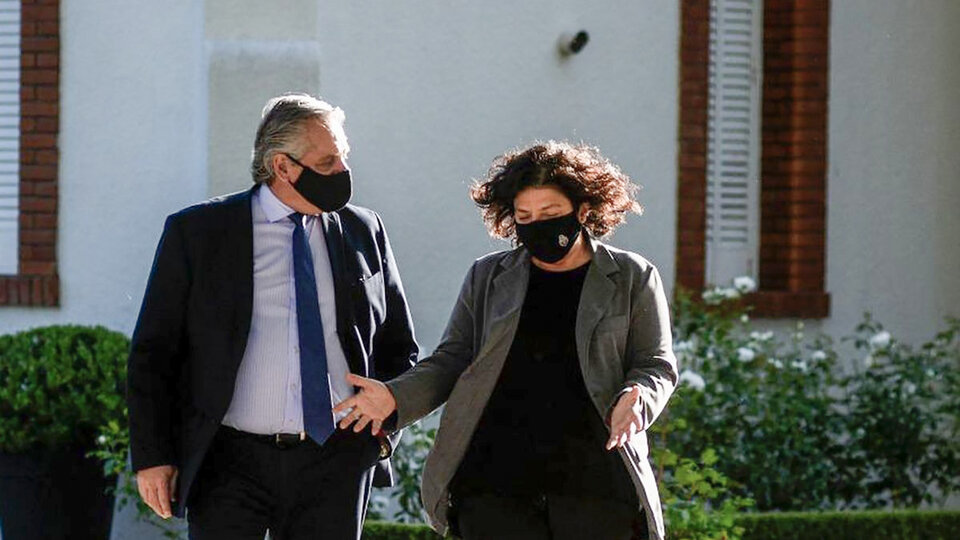The Omicron variant of coronavirus is causing concern around the world and Argentina is no exception. From the Government they explain to this newspaper that given the advance in the region of the new African strain it is more necessary than ever to have “prudence and caution”, and from the Ministry of Health they anticipate that the use of a “pass will be implemented in the country sanitary “for those over 13 years of age in which they are still working to define the specifications. The central objective of the Government when implementing this measure is to promote vaccination because, the more people inoculated, the less the advance of the new variables. President Alberto Fernández referred to the inequality in the distribution of vaccines worldwide during his speech at a meeting of the Puebla group and the consequences that this generates. “Africa was left to its own devices with vaccines, facing a new variant that puts the entire international system in check again,” he explained. Then, he added that “this occurs while 90 percent of the vaccines were distributed in the 10 percent of the most powerful countries.”
The strain that was born in Africa is much more transmissible than the Delta and after a WHO alert many countries began to take more extreme measures of care and incentives and even fines to encourage vaccination in their populations. In our country, meanwhile, on Friday the resumption of direct flights from Africa was delayed and earlier this week the Government also imposed a mandatory quarantine for travelers returning from that continent. The health pass is the measure that needs to be implemented and that will be made official in the coming days.
From the health portfolio that Carla Vizzotti leads, they clarify that it is something dynamic and that it can change depending on the epidemiological situation, but that the health pass, in principle, would apply to massive events of more than 1,000 people – even those that take place at the outdoors – and also for recreational activities that take place indoors, such as bowling alleys. It would not be implemented in work spaces, or in public transport, as the Minister of Health of the Province of Buenos Aires, Nicolás Kreplak, had anticipated. From the Nation, however, they clarify that each province will have autonomy to give the pass the form it deems necessary.
This Tuesday, with the problem of the new variable in mind, Alberto Fernández met with Vizzotti at Casa Rosada. The Minister brought him a summary of the current health situation in the country and what was discussed on Friday at the meeting of the Federal Health Council (Cofesa). The level of vaccination of the population and the concern for the global advance of the Ómicron were two central axes of the meeting. There, the health ministers of all the provinces agreed on the importance of implementing a health pass – which will appear in the Cuidar App – that people over 13 years of age must have, in order, as explained by the Government, “to encourage vaccination and minimize the possibility of virus transmission in activities that imply greater risk, such as mass events and specific activities in closed spaces “.
After the Cofesa meeting, the PBA health minister said in a radio dialogue that “we are working to get everyone vaccinated because we have to reach that 20 percent of the population that we did not reach. That is why the health pass.” But confusion was generated because in that same interview, Kreplak had detailed that “we talk about any situation of closed places, such as public transport, work, etc.”, and stressed that “if we go to any closed place, any, it is with the complete vaccination schedule from 13 years of age. This is recreational, sports, work, cultural and public transportation events. Any closed place one is going to be. This is in force in many countries of the world ”.
Later Vizzotti clarified that at this stage “the school environment, the workplace, or public transport are not included”, and specified that in those places “the care, testing and case management protocols already in force must be maintained” . From the national Health portfolio they also detailed that in COFESA they agreed that each province could decide whether or not to add places to enter with a pass.
It still remains to know the final letter of the Resolution or Administrative Decision that will put the health pass into effect, a task that will be carried out by the Legal and Technical secretariat. From the Province of Buenos Aires they clarified to this newspaper that they will wait until that moment to define whether or not the district adds any restrictions, beyond what is defined at the national level. The same should evaluate the rest of the jurisdictions.
The governor of the Province of Buenos Aires, Axel Kicillof, meanwhile, this Tuesday expressed that he agrees with the implementation of the pass because “it is a matter of public health and not individual.” In a radio dialogue, the governor also indicated that “we are going to evaluate the measures because we must see when we finish exhausting the shifts, we had a million people left, but we have opened free vaccination and there is an improvement in access. The objective is to fully cover the population ”. Lastly, Kicillof pointed out that “we need to cover everyone because the variants are more contagious. Those who have not been vaccinated, if they catch them have no response. Those who are not vaccinated allow the virus to enter and spread.”
– .


